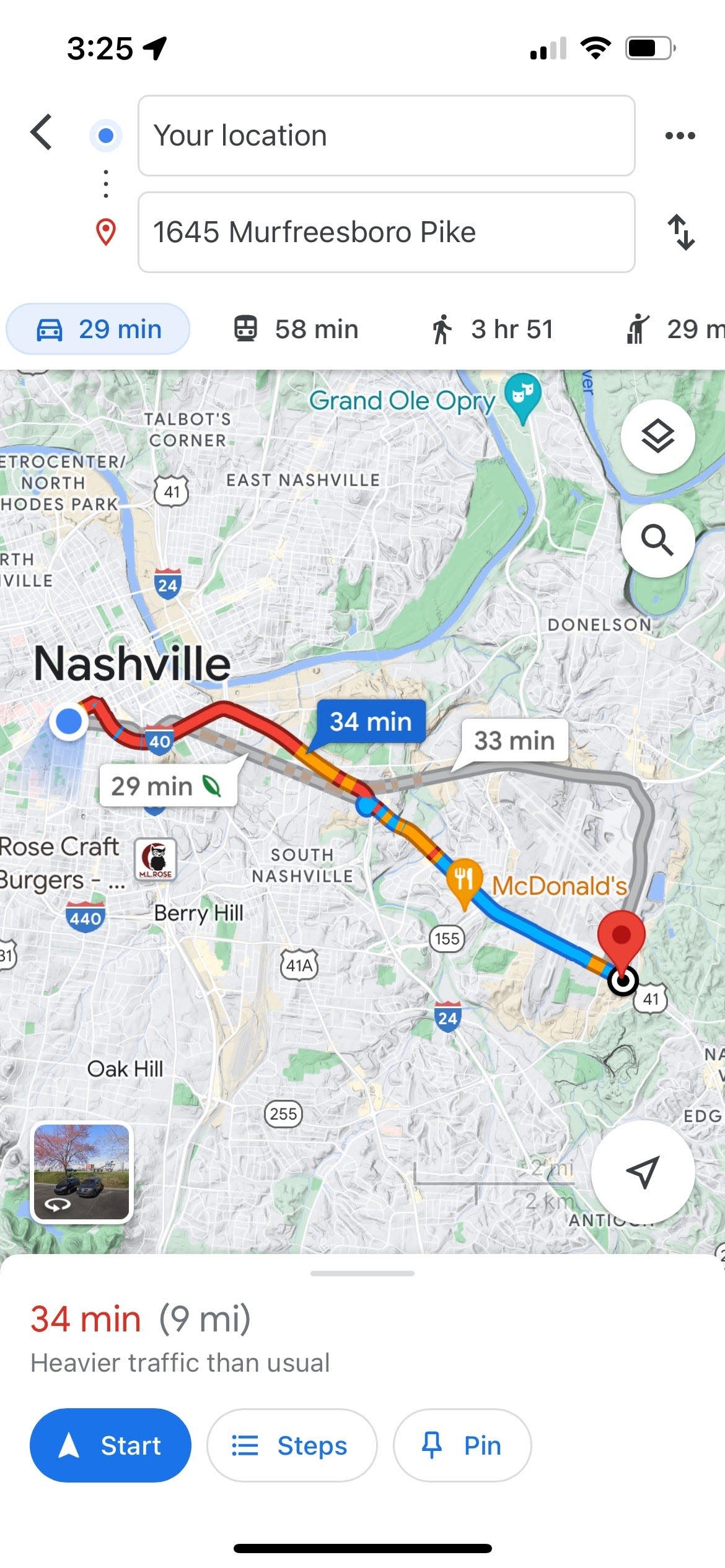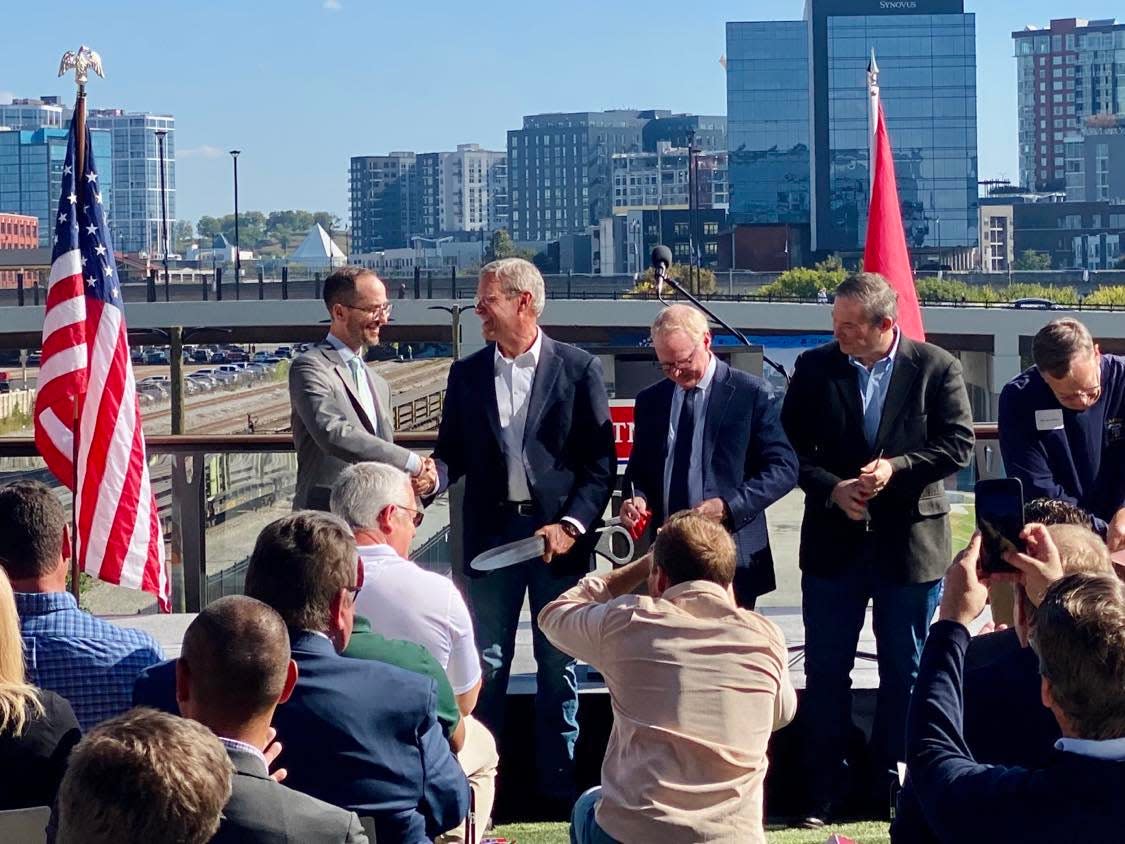Congrats, Nashville! We have America's worst commute. And it's not getting better.
The destination for an event I attended Monday near Nashville International Airport was a mere 9 miles away from The Tennessean’s office in Midtown, but it felt so much longer.
The Google Maps route bled the color red along Interstate 65 South and 40 East, indicating heavy traffic congestion. Going through town would not be any better, according to the app.
A drive that might have taken 15 minutes when I first arrived in town nine years ago totaled at least a half hour now. The congestion, distracted drivers and green lights that turned red too quickly once I exited the interstate added to my frustration. I know so many others can relate and often go through far worse.

Nashville’s growth has exploded over the last decade and with the exception of a slight population dip in 2021, things are back on track. The city has received the distinction of being the downtown that recovered best from COVID and the No. 1 real estate market to watch.
But Music City now also holds the unflattering distinction of having the worse commute in America, according to Forbes. Growing congestion and frustration could stifle the city’s economic prosperity, but the data offer another sign that Nashville and the Middle Tennessee region must accelerate the work on creating viable alternatives to traffic, including transit.
That’s going to take buy-in from lawmakers and voters. More on that in a moment.
Another view: My neighbor Freddie O’Connell wins race for Nashville mayor and offers hope for residents
Remember the ‘Don’t be like Atlanta’ ads four mayoral elections ago?
In 2015, Nashville mayoral candidate David Fox ran on a message of preserving “The Nashville Way.”
The expression alludes to keeping the things that kept small-town Nashville appealing to residents, newcomers and visitors while embracing the benefits of growth, the “it” city cachet bestowed on it by The New York Times in a 2013 article and its emerging role as a global destination.
Fox’s campaign produced a commercial called “Lessons” where commuters are stuck in Atlanta traffic and one woman holds up cards like in the movie “Love Actually” telling Nashville voters this:
“Hey Nashville. Welcome to Atlanta. Don’t make the same mistakes we did. Fight to protect your way of life. The Nashville Way. It’s not too late.”
Interestingly, Atlanta did not make Forbes’ Top 25 list of worst commutes in 2023.
Forbes ranked U.S. cities based on a methodology that included average time spent driving, walkability, bike friendliness and transit.
The combination put Nashville at No. 1 followed by:
Charlotte, North Carolina
Jacksonville, Florida
Houston, Texas
Washington, D.C.
Another view: Nashville transit: Moving forward will be incremental. Commuters have options they are not taking
Nashville’s transit referendum went down in flames, but it’s time to try again
Fox lost the 2015 runoff election to former Mayor Megan Barry who proposed a massive multibillion-dollar transit plan that nearly two-thirds of voters rejected in 2018.
Since that time and three mayors later, Nashville has made modest headway on transit investments.
New Mayor Freddie O’Connell, a former District Council member and chair of the Metropolitan Transit Authority board who used to commute to work on the bus, came into office in September with transit bona fides and pressure from civic and business leaders to propose a plan to the council and voters sooner than later.
Nashville’s WeGo Transit system is recovering ridership though regional ridership is still down.
Prior to COVID-19, Census numbers showed that 2% of the region’s commuters took transit to work. That fell to 1% post-pandemic.
There appears to be a combination of factors from net growth to work-from-home policies.
Hear more Tennessee Voices: Get the weekly opinion newsletter for insightful and thought provoking columns.
Things to consider when crafting a new transit plan
During his campaign, O’Connell discussed the factors that helped kill the 2018 referendum.

They included the price tag, the emphasis on light rail and the mystery tunnel underneath downtown that was not well-defined and exploited as a potential boondoggle by critics.
Many critics, especially from the heavy opposition outside Nashville’s urban core, felt their needs and interests were excluded from the plan and did not see the benefit.
Mayors in the Middle Tennessee region have been working on regional planning and approved an update in 2021, according to the Greater Nashville Regional Council, which is led by city and county executives in 13 counties.
COVID slowed down regional cooperation, however, recent developments such as the passage of Gov. Bill Lee Transportation Modernization Act in 2023 and the Biden Administration’ s Infrastructure Investment and Jobs Act in 2021 provide opportunities for more funding for grants and bus-rapid transit expansion.
A 2017 law, called the IMPROVE Act, allowed for counties and cities of a certain size to hold referenda on transit, but they were limited to going it alone. State lawmakers should amend the legislation to incent and ensure more cooperation.
What should transit look like and when should voters vote on it?
My first year in Nashville, I rode the bus weekly for a year and documented my experiences, adding to the call for the city to increase bus frequency, create mobile payment options and tracking.
All these things have happened.
However, what a comprehensive regional transit system would like in Nashville is still up in the air. Collectively and historically, we as a community don’t ride it.
My conversations with residents in the area have told me people conceptually transit for someone else. Then, there’s the question of who’s going to pay for it?
This will require more intentional conversations with neighborhoods, local and state elected officials, workers and business leaders.
But now is the time to hold those conversations and aspire to bring something concrete, narrow, focused and clear to the voters by the 2024 November election.
Maybe that’s too soon, but the longer we wait, the more we will get behind cities like Atlanta, Los Angeles and even New York.
David Plazas is the director of opinion and engagement for the USA TODAY Network Tennessee. He is an editorial board member of The Tennessean. He hosts the Tennessee Voices videocast and curates the Tennessee Voices and Latino Tennessee Voices newsletters.. Call him at (615) 259-8063, email him at dplazas@tennessean.com or tweet to him at @davidplazas.
This article originally appeared on Nashville Tennessean: Nashville has the worst commute in US. Traffic will only get worse
